The truly amazing thing about the episode is just how much life it can fit into this rubric. When you think about it, despite the proscriptive narrowness of its title, The Affair has encompassed an enormous panoply of emotions and experiences. Estrangement between parents and children of all generations and ages. The loss of a child. The end of multiple marriages. The allure of sex. The keeping of a horrible, life-ending secret. Poverty and wealth. The life of a small summer resort and the divide between townies and tourists. Writing, publishing, teaching. Booze, weed, and cutting as self-medication. That left-field storyline about the Lockharts’ murderer grandfather. The freaking restaurant business. That none of it feels forced, that all of it seems to emerge organically from the titular affair rather than being grafted on to it in order to flesh out multiple seasons of TV, is close to a miracle.
“The Affair” thoughts, Season Three, Episode Two
“Westworld” thoughts, Season One, Episode Nine: “The Well-Tempered Clavier”
It’s not the content that’s to blame for the episode’s shortcomings, but the delivery mechanism. From start to finish, the hour’s events move in fits and starts, with the herky-jerky rhythm of a malfunctioning host. How else could it work, when nearly all its focal-point characters are constantly moving in and out of awareness? Teddy wakes up from being shot with an arrow, then is promptly killed again. The Man in Black watches all of this smugly, until he gets knocked out; the next morning he realizes he’s about to get hanged from a tree courtesy of a noose and a skittish horse. He narrowly escapes, but only to have his narrative stopped in its tracks once again by a visit from Charlotte Hale, one of his fellow members of the park’s board of directors. Logan torments his estranged brother-in-law-to-be and Dolores until the latter escapes and the former pretends to forgive him. Cue the smirking asshole waking up the next morning with all his robotic Confederado comrades massacred and the born-again-hard William firmly in charge.
The self-aware hosts go through even more fake-outs and double-backs. Dolores shifts back and forth between locations, time periods, and states of consciousness so frequently that it’s impossible to keep track of – deliberately so, but that doesn’t prevent it from undercutting the emotional impact of her discovery that she murdered her maker. And poor Bernard splits his time between getting switched on and off by Maeve and Ford on the one hand, and being jolted in and out of his robotic consciousness and memories. Many of said memories involve killing other characters, like Theresa and Elsie, just to add to the staccato storyline. Sometimes he’s not Bernard at all, but Arnold … or at least Dolores’s deep-rooted memory of him. His Doctor-ordered suicide at the end of the episode comes as sweet relief after the mindfucks he’s been through. When the storyline that suffers the fewest interruptions of this sort (i.e. Maeve’s rebellious arc) involves our heroine breaking down a fellow robot’s mind before deliberately burning them both to death en flagrante delecto, you know things have gotten way too complicated.
Add it all up and it’s like watching a version of The Usual Suspects in which both Chazz Palmintieri and Kevin Spacey’s characters are constantly getting hit in the head with a baseball bat. (And are then forced to try and pick up the story where they left off hours later.) There’s just no way for it to sustain momentum, tension, or suspense – let alone make its plot twists and shocking revelations work properly – when every character is so busy just trying to stay sentient and upright.
The Boiled Leather Audio Hour Episode 56
Sean and Stefan discuss the election of white nationalist Donald Trump as President of the United States of America.
Additional links:
Our Patreon page at patreon.com/boiledleatheraudiohour.
Our PayPal donation page (also accessible via boiledleather.com).
True story
A couple days ago I unfollowed the latest in what is easily a half-dozen occult or BDSM-porn tumblrs I’ve followed that out of nowhere revealed themselves to be white supremacists, neo-pagan race-realist weirdos, actual Nazis, anti-Black Lives Matter racists, Sandy Hook truthers, etc. Later that day I renewed the rental agreement on my apartment. In the course of the conversation as I handed over the signed lease, my very friendly landlord, noting that I work for Rolling Stone and the New York Times, told me she regularly fact-checks what she reads in mainstream media like the publications I write for, which is how she learned that Sandy Hook never actually happened. Her husband chimed in to say the moon landing was faked as well. In conclusion, America is already great
You won’t fool the children of the revolution
(“Raw Power” comes on in the car)
Me: This is a band called Iggy & the Stooges. The lead singer’s name is Iggy Pop, and he did all kinds of crazy things. He smeared himself in peanut butter, he’d break bottles and cut himself up, he covered himself in honey and sprinkled glitter on himself, he’d even just walk right on top of the audience.
My 5 1/2 year old: They could get a concussion! Did he wear anything crazy too?
Me: He was really muscular, and he’d come out in no shirt and, like, very tight silver pants.
My 5 1/2 year old: That’s crazy! Were you there, Daddy?
Me: Was I there? No. This was in the early ’70s, so…like, 45 years ago, almost. Before I was born.
My 5 1/2 year old: Then how do you know about it? How do you know all about these things if you weren’t there?
Me: Because it was very famous, and people wrote all about it. You can read books that tell you all about different bands from a long time ago.
My 5 1/2 year old: Tell me EVERY STORY about EVERY CRAZY THING anyone did in EVERY BAND, PLEASE!
“The Affair” thoughts, Season Three, Episode One
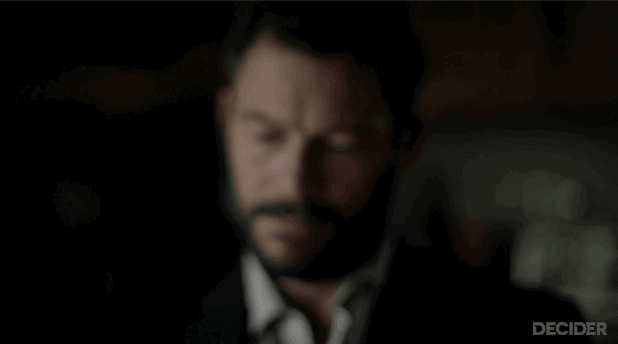
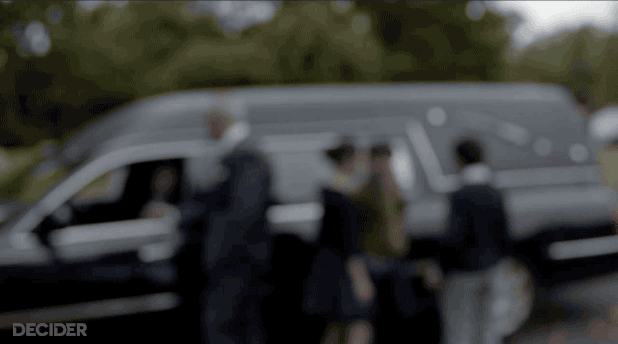
This is an exceptionally smartly shot show, even when the seaside vistas of Montauk aren’t there to provide production value. Look at this trio of shots in which we slowly fade into Noah’s world, first at the start of the episode, then graveside after the funeral for Noah’s father, then the following morning. It’s a restrained but unmistakable way to show us that our presence here, our view of what’s happening, is tied directly to Noah; his presence literally clears things up. It also offers a tantalizing hint that reality may be hazier than it first appears.
“Westworld” thoughts, Season One, Episode Eight: “Trace Decay”
The episode is less persuasive when it shifts its gaze from the robot mind to the human one. Before Ford wipes his secret android minion Bernard’s memories of his murder of, and relationship with, Theresa Cullen, the perplexed ‘bot asks his maker what separates his pain and experiences from that of a normal person. If all of this stuff ultimately exists in the brain and nowhere else, who’s to say where the line is drawn between the stuff of life and the merely “lifelike”? Noting that his old frenemy Arnold was tormented by the same question, the Doctor dismisses it. There is no difference, he says, because human consciousness is just as much an illusion as that of the hosts. We too are locked in loops and routines, rarely challenging our drives and desires, perfectly happy to follow orders. The only difference between machine and man is that the latter can at least be aware of his plight, and holds the remote control over the former.
Which is true, so far as it goes, but that’s not very far at all. The question of “what makes us truly human” has always been one of the least interesting ones science fiction asks because the answer is all around us. Love, happiness, suffering, memory, anticipation – even if they’re all just part of our brains’ core code, it’s the only code we have. It’s not as if we’re living a lie when we experience these things, since there’s no way to access any other deeper “truth” about reality. False or not, our consciousness is inescapable. No matter how much Ford sneers about it as he uses his iPad or whatever to reprogram his Frankenstein’s monster, it doesn’t give him, or us, an escape route.
“Empire” thoughts, Season Three, Episode Six: “Chimes at Midnight”
As its initial installments this season have made plain, Fox’s hit show “Empire” has been losing a two-front war. On a meta level, can a show that draws much of its heat from tapping the pop-cultural and political zeitgeist keep pace with the chaos of 2016? And in terms of plot, can it keep the soap suds bubbling by simply pitting the members of the Lyon family against each other — and against Lucious, in particular — again and again?
So far, notwithstanding its persistently strong performances (and ratings), the answer to both questions has been no.
Until this week. Like the cold shower that jolts the troubled son Jamal back to consciousness after he pops one too many pain pills, Episode 6 is a welcome shock to the show’s system. It centers on a cybersecurity story line that’s all too resonant with real-life events. And in the person of the hack’s surprising architect, the story line offers a way out of the endless cycle of alignment and realignment among the sparring Lyons, presenting Lucious with a worthy adversary for what may be the first time in the show’s history.
“Empire” thoughts, Season Three, Episode Five: “One Before Another”
“Fighting is your family’s way of life,” Councilman Angelo Dubois tells Cookie Lyon. “It’s like it’s in your blood.” Normally a statement like this would be considered an insult. Angelo, however, means it as a heartfelt insight, if not an outright compliment. After witnessing the latest public throw-down involving Cookie’s kin, he’s become enlightened about her needs: He’s going to fight on her behalf just as ferociously as the members of her family fight among themselves.
The councilman’s attempt to make virtue out of vice serves as a neat little mission statement for this week’s episode. As the still-young third season of “Empire” has made abundantly clear, the Lyons are locked in an endless cycle of conflict, with various members of the family forging and breaking alliances as readily as Oceania, Eurasia and Eastasia do in the George Orwell novel “1984.” (You practically need a flowchart to keep track of Hakeem’s allegiances in this episode alone, for example.) True, Lucious Lyon is nearly always the source of that conflict, and all that pot-stirring has rendered his character inert. But he’s obviously not going anywhere. So if “Empire” is to remain at the pinnacle of prime-time soap, it has to keep the fighting fresh and vital.
[…]
But that’s just it: Soul feels in short supply on “Empire” these days. The performances remain engaging — Taraji P. Henson’s star as Cookie grows brighter with each episode, and Jussie Smollett and Bryshere Y. Gray continue to do warm and nuanced work as Jamal and Hakeem, the family’s reluctant Cain and Abel — and individual scenes can be a lot of fun. But how many times can we watch the same five characters argue over the same set of issues? If any of the alignments lasted for longer than a few episodes at a time — if, say, Hakeem spent most of the season as a peacenik before snapping instead of making the reversal in the space of a couple of commercial breaks — the battles might feel worth waging.
As it stands, “Empire” is full of sound and fury; and while it’s probably taking it too far to paraphrase Shakespeare, the show’s patron saint, and say that the show signifies nothing, it is hard to hear a heartbeat above all the noise.
“Westworld” thoughts, Season One, Episode Seven: “Trompe L’Oeil”
SPOILER ALERT
For sheer entertainment value, the biggest shift isn’t in Bernard, but his creator. Nearly a quarter-century after his star turn as Dr. Hannibal Lecter in The Silence of the Lambs — a role he revisited twice, to diminishing returns, amid a virtual buffet of ham-based entries on his IMDB page — it’s easy to forget just how menacingly minimal Anthony Hopkins can be. The “I ate his liver” speech and the face-peeling shenanigans have the biggest pop-culture footprint, of course. But his Hannibal was at his most ominous when he was standing still, the ghost of a smile on his face and fire in his eyes, quietly tearing people to mental shreds with just his words.
The brilliance of his take on that iconic killer is visible in Ford’s full-fledged heel turn. Gone is the cryptic old-man-of-the-mesa routine, dispensing wit and wisdom in a bemused British accent. In his place is a stone-cold lunatic, and if Bernard’s very existence is any indication, he’s been mad as a hatter for literally decades. Staring into that face — which is positioned almost, but not quite, to look directly into the camera, a la Lambs‘ Lecter v. Clarice conversations — you can feel hope evaporate in the heat of his squinty glare. This guy’s too smart, to prepared, too ruthless, and too insanely dedicated to his mad project to possibly be beaten in the basement of his own sanctum sanctorum. It takes Ms. Cullen longer to realize this than it takes us, and the Doctor has no patience with it: The look of combined boredom, impatience, and condescension as he watches her try to call for help is a thing of dark delight. The brutal murder that follows is almost an afterthought; you could see her death reflected in his eyes long before he gave his robotic right-hand man the order. You wanted an “adversary”? You’ve got one.
11.9.16
As he followed her inside Mother Abagail’s house he thought it would be better, much better, if they did break down and spread. Postpone organization as long as possible. It was organization that always seemed to cause the problems. When the cells began to clump together and grow dark. You didn’t have to give the cops guns until the cops couldn’t remember the names…the faces…
Fran lit a kerosene lamp and it made a soft yellow glow. Peter looked up at them quietly, already sleepy. He had played hard. Fran slipped him into a nightshirt.
All any of us can buy is time, Stu thought. Peter’s lifetime, his children’s lifetimes, maybe the lifetimes of my great-grandchildren. Until the year 2100, maybe, surely no longer than that. Maybe not that long. Time enough for poor old Mother Earth to recycle herself a little. A season of rest.
“What?” she asked, and he realized he had murmured it aloud.
“A season of rest,” he repeated.
“What does that mean?”
“Everything,” he said, and took her hand.
Looking down at Peter he thought: Maybe if we tell him what happened, he’ll tell his own children. Warn them. Dear children, the toys are death–they’re flashburns and radiation sickness, and black, choking plague. These toys are dangerous; the devil in men’s brains guided the hands of God when they were made. Don’t play with these toys, dear children, please, not ever. Not ever again. Please…please learn the lesson. Let this empty world be your copybook.
“Frannie,” he said, and turned her around so he could look into her eyes.
“What, Stuart?”
“Do you think…do you think people ever learn anything?”
She opened her mouth to speak, hesitated, fell silent. The kerosene lamp flickered. Her eyes seemed very blue.
“I don’t know,” she said at last. She seemed unpleased with her answer; she struggled to say something more; to illuminate her first response; and could only say it again:
I don’t know.
–Stephen King, The Stand
“Westworld,” and When TV Uses Pop Music to Do Its Emotional Heavy Lifting
Maeve’s walk through the Westworld theme park’s behind-the-scenes house of horrors is the moment we’ve all been waiting for. It’s the instant in which one of Westworld’s unfortunate, unwitting robots receives undeniable, unforgettable confirmation that their life is a lie. It’s a crushing concept all on its own, and the guided-tour-of-hell structure of the scene adds to the pathos. By rights it should stand alone as one of the series’ most powerful moments.
And yet, Westworld’s treatment of it falls flat. Like park technicians fiddling with a host’s intelligence or empathy on their control panels, the show’s filmmakers artificially increase the sequence’s tear-jerking levels by soundtracking it with a chamber-music version of the closing track on one of the most acclaimed albums of all time: “Motion Picture Soundtrack,” the achingly sad conclusion of Radiohead’s electronic-music breakthrough Kid A. It’s not the first time the hyperactively overscored series has relied on the band, having previously gone to the Radiohead well with their suburban-ennui anthem “No Surprises.” Hell, it’s not the first time it did so in this episode, which opens with a similarly heavy-handed accompaniment by a player-piano version of the band’s ode to falseness, “Fake Plastic Trees.” But it is the show’s most egregious example yet of using a song with preexisting cultural clout to do its emotional work — a syndrome we’re seeing, or hearing, with increasing frequency as Peak TV prestige dramas attempt to cut through the clutter and grab viewers, or listeners, by the heartstrings.
Rather than let the power of the scene emerge on its own, Westworld leans on a preexisting work of art to doing the heavy lifting for it. It’s a cheat, a shortcut to resonance. That particular work of art has far more cultural purchase, impact, and history than a first-season TV show. Even if you don’t rate Radiohead, substitute the gut-wrenching classic-album closer of your choice — “Purple Rain” or “Little Earthquakes” or, to cite an artist Westworld’s already employed to dubious effect in that over-the-top orgy scene last week, “Hurt”— and you’ll get the point.
Over at Vulture, I went long on how shows like Westworld, Stranger Things, and even The Americans have used preexisting pop music as a cheat code to score emotional points they haven’t earned. I also talked about shows that have done pop music cues right, from The Sopranos and The Wire to Lost to Halt and Catch Fire and The People v. O.J. Simpson. It’s basically a prose version of what Chris Ott and I talked about on his Shallow Rewards podcast a few weeks ago. I quite liked writing this piece and I hope you enjoy it.
“Westworld” thoughts, Season One, Episode Six: “The Adversary”
Westworld is a show about androids, but the titular theme park’s biggest problem is – let’s face it – its H.R. department. Delos, the corporation behind the theme resort, has based its staffing structure around a system of checks and balances – though in practice it’s more like Republican and Democrat zero-sum party politics, or a Hobbesian war of all against all. The boffin-y behavioral scientists, the temperamental artists who craft storylines, the hardcases who handle security, the grunts in the basement chop shop: They work against each other far, far more than they work together. According to Theresa, who breaks up with Bernard because the conflict of interest their relationship represents, that’s by design.
Okay, fine. After all, this might explain the constant backbiting and infighting we were complaining about last week. (Explain, mind you, not excuse: Just because it has an in-story reason for happening doesn’t make non-stop conflict any less boring to watch.) But in this week’s installment – “The Adversary” – this policy winds up raising more questions than it answers. In a theme park this paranoid, how the hell can so many people get away with breaking the rules?
[…]
Obviously, science fiction requires suspensions of disbelief – otherwise it’d just be “science” – and few stories of any kind are so flawless that there are no plot holes to overlook. In that light, all this nitpicking about lousy stop-loss practices by park staff could be seen as just that: nitpicking. But logical gaps are easier to cross when we’re given enough material of value to build bridges, and that’s where Westworld fails time and again.
There’s nothing wrong with the Westworld theme park a few security cameras couldn’t fix, and other observations: I reviewed this week’s Westworld for Rolling Stone.
STC & JEG @ CAB
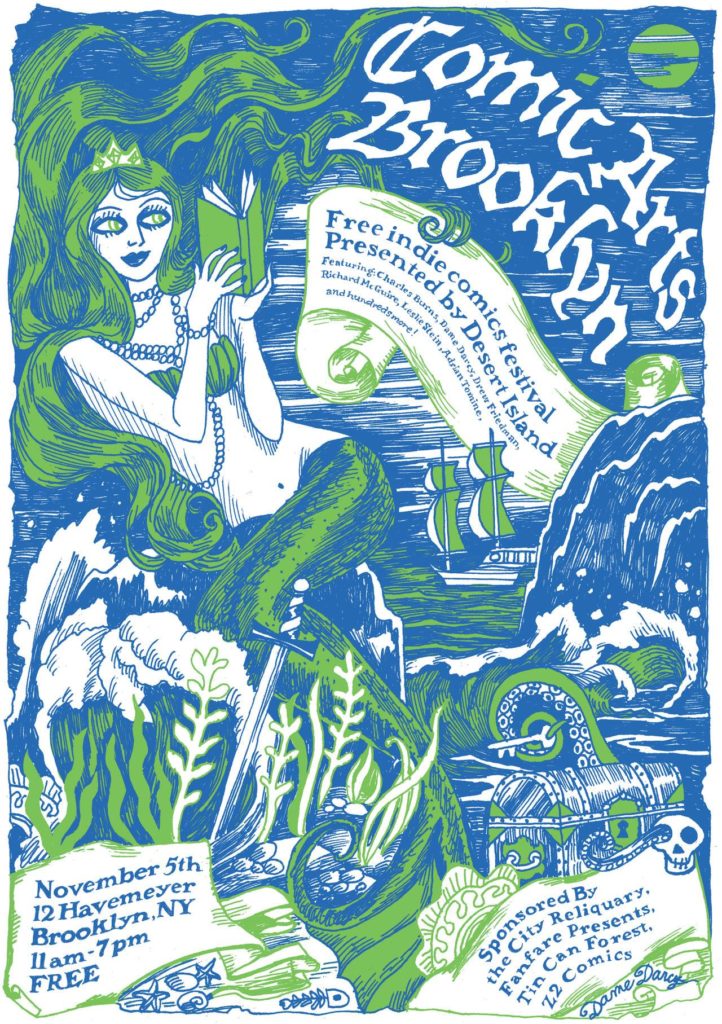
Julia Gfrörer and I, and more importantly OUR TWO ADORABLE CHILDREN, will be attending the Comic Arts Brooklyn festival tomorrow from 11am – 7pm at Mt. Carmel Church in Williamsburg. We hope to see you there! Find us at table U26.
Preorder MIRROR MIRROR II
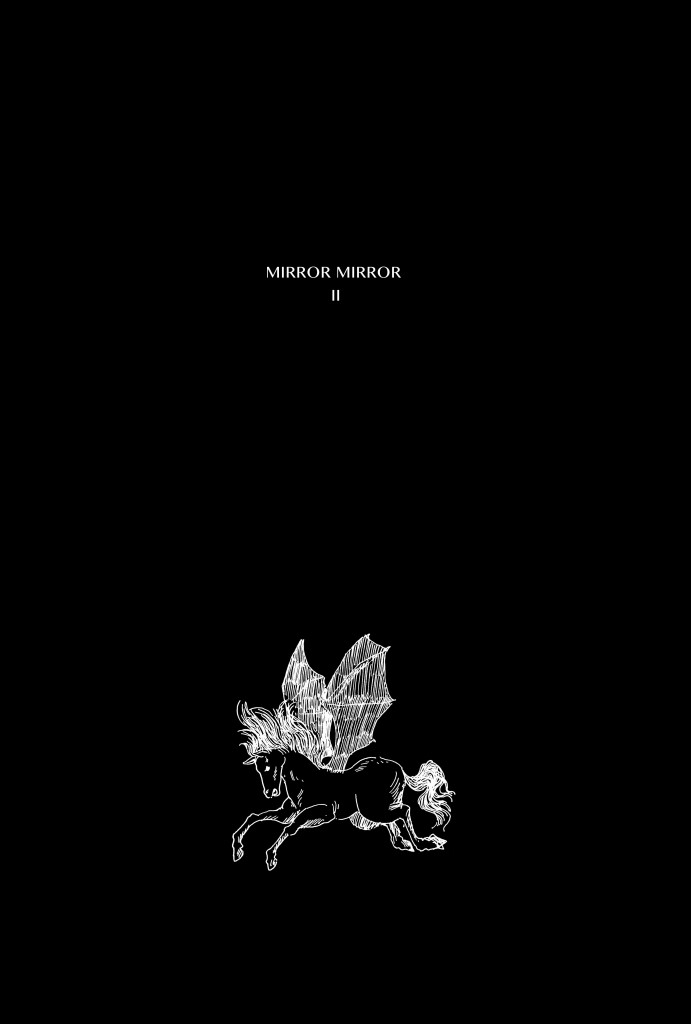
Mirror Mirror II, the comics and art anthology I’m coediting with Julia Gfrörer, is now available for preorder on Amazon. The book contains new and unpublished work from Lala Albert, Clive Barker Heather Benjamin, Apolo Cacho, Sean Christensen, Nicole Claveloux, Al Columbia, Dame Darcy, Noel Freibert, Renee French, Meaghan Garvey, Julia Gfrörer (with Claude Paradin), Simon Hanselmann (with Sean T. Collins), Aidan Koch, Laura Lannes, Céline Loup, Uno Moralez, Mou, Jonny Negron, Chloe Piene, Josh Simmons, Carol Swain, and Trungles, with an introduction by Gretchen Felker-Martin.
But you don’t have to take my word for it:
“A thought-provoking, richly entertaining collection from some of the most exciting comic artists working today. A must read for fans of the horrific and perverse.” —Bryan Cogman, co-executive producer/writer, Game of Thrones
“Editors Sean T. Collins and Julia Gfrörer have assembled an exquisitely creepy and seductive new collection of comics with Mirror Mirror II. From Uno Moralez’s pixilated noirs to Dame Darcy’s ornate Gothic ghost stories, the wide range of horror here is fantastic, as characters creep and fuck in the shadows of unimaginable darkness throughout. It’s certainly the perfect, freaky anthology for you, your lover, and all the demons in your mind.” —Hazel Cills, MTV News
The 25 Greatest ‘Game of Thrones’ Moments
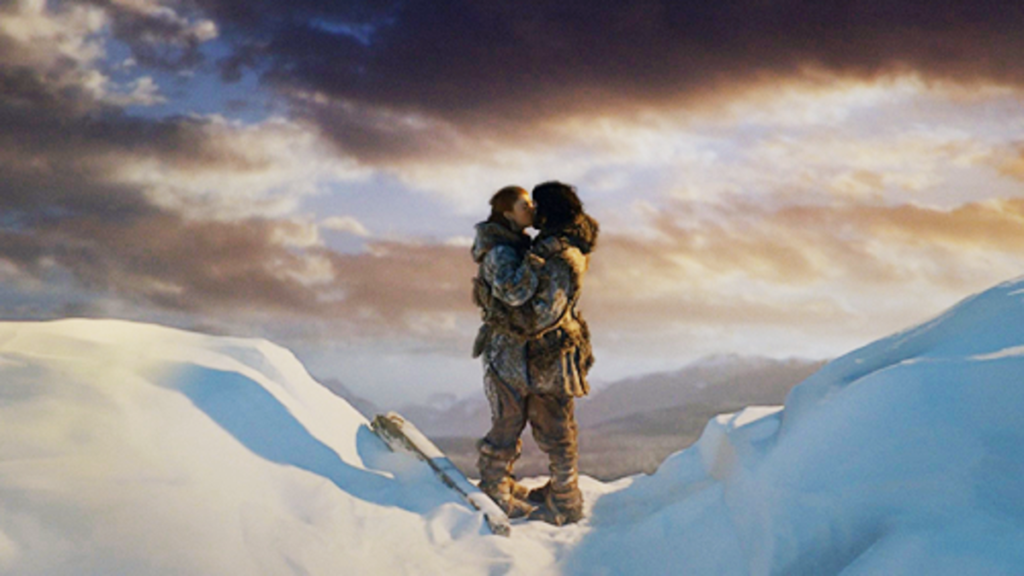
10. The Kiss on the Wall
Season 3, Episode 6: “The Climb”
To paraphrase David Bowie, let’s remember Jon Snow and Ygritte standing on the Wall, where they kissed as though nothing could fall. The star-crossed couple’s big moment came after a pulse-pounding sequence in which their raiding party scaled the treacherous icy obstacle, nearly dying in the process, so their mere survival was cathartic enough. But the future Lord Commander and his wildling lover seized the moment – and the stunning, sunlit view – and locked lips in the series’ single most romantic shot to date. Game of Thrones so rarely gives us reasons to simply be happy; these two crazy kids never got one again.
I ranked and wrote about the 25 Greatest Game of Thrones Moments for Rolling Stone. If you like my writing about this show at all, I think what you like about it probably comes through very strongly in the nature, order, and explanation of my selections. I hope you enjoy them.
“Westworld” thoughts, Season One, Episode Five: “Contrapasso”
Granted, Logan has no redeeming qualities in any capacity, so his behavior toward his colleague shouldn’t come as a surprise. But it speaks to the fundamental misapprehension Westworld has about what makes a compelling workplace drama. You need tension and conflict and even the occasional full-fledged feud. But neither the show nor the fictional business it portrays will come together if that’s all you’re getting. Both Mad Men and Sterling Cooper would have collapsed had Don Draper not been a charming companion and a surprisingly good mentor in addition to everything else. The Wire would have had no story if McNulty and Daniels, or Stringer and Avon, had always been at each other’s throats. Halt and Catch Fire, AMC’s little-watched but much-admired series about the dawn of the Internet age, spent an entire season with its main characters screaming at each other, before realizing show would seem less grating if they worked together.
Unless and until Westworld realizes the same thing, it’s always going to feel like a fraction of the series it could be. Yes, you get your requisite gory violence and copious nudity, including HBO’s second clinical close-up of a black man’s penis this year after The Night Of (and a ridiculous robot orgy soundtracked by a chamber-music version of Nine Inch Nails’ “Something I Can Never Have”). You get all the guessing games about multiple time frames and hidden programming, the doppelgangers of Dolores and Lawrence, and the truth about the late great Arnold. All of this will only get you so far. To quote George Costanza, “We live in a society!” even if the employees’ role in it is to create a lawless version thereof. People need to work together, at least sometimes, for that society to function. The humans on the show need to acting like humans for us humans on the other side of the screen to truly care.
I reviewed this week’s Westworld for Rolling Stone, ignoring the clues and theories in favor of talking about a far more fundamental problem. We’re all free to do this kind of thing! Nothing says we have to “solve” a show constructed as a puzzle box.
The Boiled Leather Audio Hour Episode 55!
Forecasting The Winds of Winter, Part 3: The South
We’ve tackled the North and the lands of Essos. Now our popular series of podcasts predicting the events of The Winds of Winter returns with a look at what Northern partisans such as ourselves would call “the South” — aka the rest(eros) of Westeros! With our usual emphasis on thematic and narrative resonance — and our usual caveat that this is all just fun speculation — we’re offering our theories on the fates of every major player and region. What does Book Six hold in store for our POV characters Sansa Stark, Cersei Lannister, Jon Connington, Arianne Martell, Brienne of Tarth, Jaime Lannister, Areo Hotah (hey, blame George), Samwell Tarly, and Aeron “the Damphair” Greyjoy? What about key supporting cast members like Petyr “Littlefinger” Baelish, the Tyrells, the Faith Militant, Doran Martell, the Sand Snakes, (f)Aegon Targaryen, Varys, Catelyn “Lady Stoneheart” Stark, Brynden “the Blackfish” Tully, Tommen and Myrcella Lannister, Walder Frey, and so on? What fates will befall King’s Landing, Oldtown, Highgarden, Storm’s End, Sunspear, and Casterly Rock? And of course, where and when will the Others and the dragons strike first? We’re taking our best guesses. See what you think!
Additional links:
Forecasting The Winds of Winter, Part 1: The North
Forecasting The Winds of Winter, Part 2: Essos
Our Patreon page at patreon.com/boiledleatheraudiohour.
Our PayPal donation page (also accessible via boiledleather.com).
STC on Inkstuds
I’m the guest on the latest episode of the venerable comics podcast Inkstuds, hosted by Robin McConnell. I talk about comics, TV, criticism, my history with all three, the Greatest Graphic Novels list I recently did, goth, the anthology @doopliss and I are doing, and more. Check it out!
